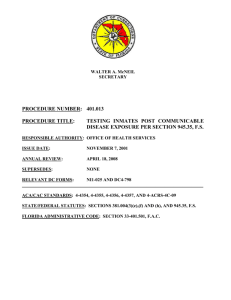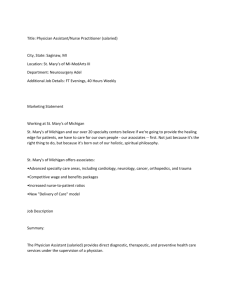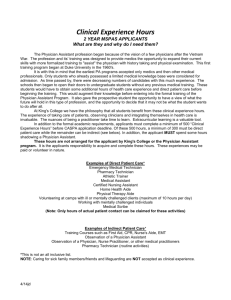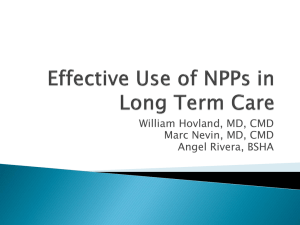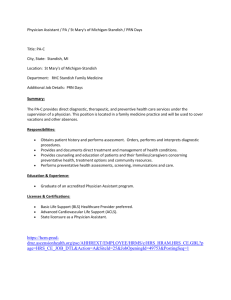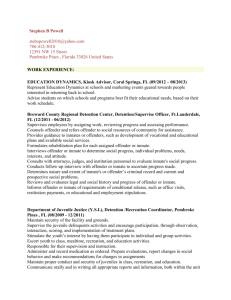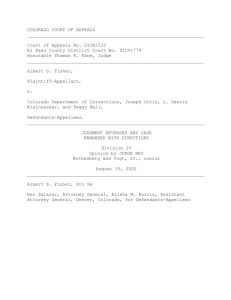401.013, Testing Inmates Post Communicable Disease Exposure
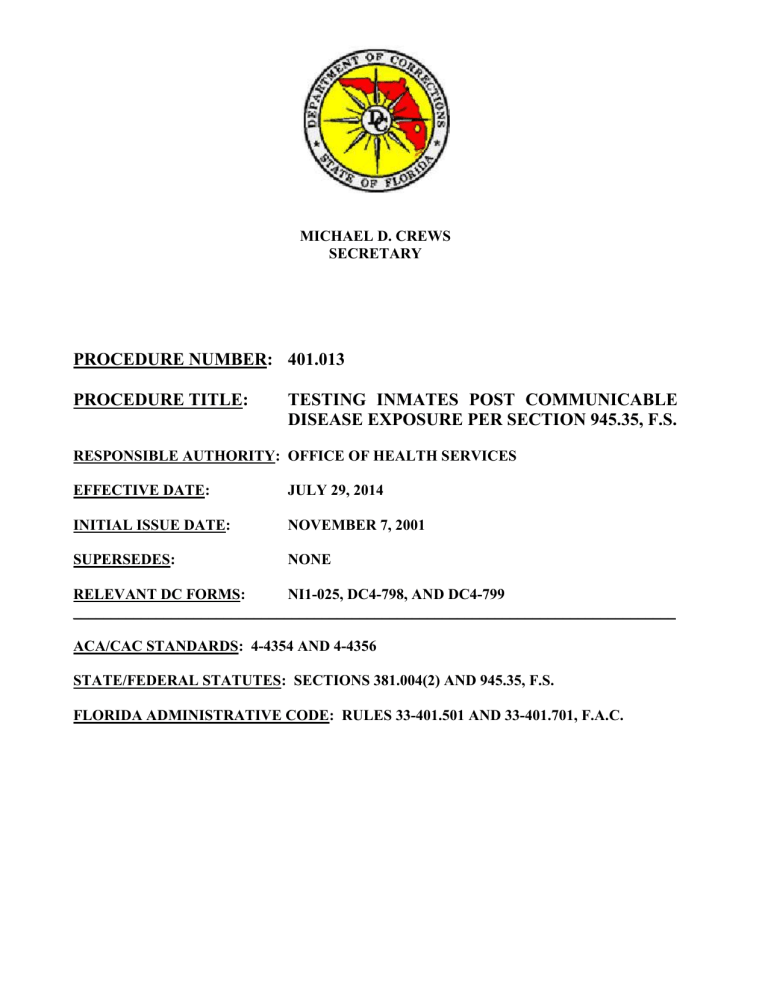
MICHAEL D. CREWS
SECRETARY
PROCEDURE NUMBER: 401.013
PROCEDURE TITLE: TESTING INMATES POST COMMUNICABLE
DISEASE EXPOSURE PER SECTION 945.35, F.S.
RESPONSIBLE AUTHORITY: OFFICE OF HEALTH SERVICES
EFFECTIVE DATE: JULY 29, 2014
INITIAL ISSUE DATE:
SUPERSEDES:
NOVEMBER 7, 2001
NONE
RELEVANT DC FORMS: NI1-025, DC4-798, AND DC4-799
________________________________________________________________________________
ACA/CAC STANDARDS: 4-4354 AND 4-4356
STATE/FEDERAL STATUTES: SECTIONS 381.004(2) AND 945.35, F.S.
FLORIDA ADMINISTRATIVE CODE: RULES 33-401.501 AND 33-401.701, F.A.C.
Procedure 401.013
PURPOSE: To provide administrative and operational guidelines for communicable disease testing of inmates who may have intentionally or unintentionally caused exposure to others.
DEFINITIONS:
(1) Communicable Disease refers to a disease which can be spread, directly or indirectly, from person to person.
(2) Medical Personnel , where used herein, includes staff employed in the following class titles:
Advanced Registered Nurse Practitioner, Certified Radiological (Technologist and Manager),
Clinical Associate, Correctional Medical Technician, Dentist, Dental (Assistant and Hygienist),
Health Support (Specialist and Aide), Laboratory (Technician and Manager), Pharmacist
(Senior and Manager), Pharmacy Technician, Physician, Medical Technologist, Nurse
(Registered and Licensed Practical), Rehabilitation Therapist and Supervisor, Respiratory Care
Specialist, Unit Treatment and Rehabilitation Specialist and Supervisor.
(3) Significant Exposure , where used herein, refers to a visible contamination with blood, body fluid, or other potentially infected materials (semen, vaginal secretions, amniotic fluid, spinal fluid, and body tissue) from one (1) person to another, via the eye(s), nose, mouth, broken or punctured skin, sexual contact, or sharing of contaminated needles or razor blades.
________________________________________________________________________________
SPECIFIC PROCEDURES:
(1) The Warden will post a “Notice Regarding Communicable Disease Exposure,” NI1-025, at the entrance of each visiting park. Such notice will inform qualified individuals of their right to request an inmate be tested when significant exposure has occurred.
(2) Any individual or inmate who reports possible exposure to a communicable disease may request testing of the source of the exposure for the communicable disease(s). Upon receipt of such request, a Physician, Nurse Practitioner, or Physician Assistant will assess the exposure to ensure it meets the criteria for a significant exposure. If criteria are not met, no testing will be required. If criteria are met, the Physician, Nurse Practitioner, or Physician Assistant will order the appropriate testing for the suspected communicable disease. In the event this is a
Bloodborne Pathogen Exposure, appropriate medical staff will complete an “Inmate
Bloodborne Pathogens Exposure Report,” DC4-799, for inmates, or an “Employee/Visitor
Bloodborne Pathogens Exposure/Screening Incident Report,” DC4-798, for staff and visitors
(staff will refer to “Emergency Treatment of Staff and Visitors,” Procedure 403.004,
“Management of Bloodborne Pathogens Exposures,” HSB 15.03.43, the Environmental Health and Safety Manual, and the Bloodborne Pathogens Exposure Control Plan).
(3) If the practitioner is not onsite, the on-call Physician will be contacted for appropriate followup.
(4)
After a practitioner’s order is received, health care staff will attempt to promptly collect the required specimen. If the inmate refuses to be tested, a Physician will contact the Assistant
Secretary of Health Services and provide the facts of the incident of exposure. The Assistant
Secretary of Health Services will contact the Office of the General Counsel. The Office of the
2
Procedure 401.013
General Counsel will advise as to whether the Department will pursue a court order to test the inmate. Reasonable attempts to obtain consent from the inmate will be made.
(5) If medical personnel are significantly exposed in the performance of their duties and a blood sample is available and the inmate is incapable of providing consent or cannot be found, an
HIV test may be conducted on the available sample. If the inmate is available, and capable of consent, but will not consent, the inmate will be informed that an HIV test will be performed on the available sample and s/he will be provided with HIV counseling. The term “medical personnel” includes:
(a) a licensed or certified health care professional;
(b) an employee of a health care professional or health care facility;
(c) employees of a laboratory licensed under chapter 483, F.S.;
(d) personnel of a blood bank or plasma center;
(e) a medical student or other student who is receiving training as a health care professional at a health care facility; and/or
(f) a Paramedic or Emergency Medical Technician.
(6) Test results will become part of the inmate’s medical record if written consent for the test was obtained from the inmate. Access will be made according to Department policy (staff will refer to “Health Records,” HSB 15.12.03 and Rule 33-401.701, Medical and Substance Abuse
Clinical Files). If a communicable disease exposure has occurred, the Physician, Nurse
Practitioner, or Physician’s Assistant will communicate the information to the concerned party.
However, if the source of the blood for testing was from an available blood sample and no consent was obtained for the HIV test, the test results will be documented only in the exposed medical personnel’s confidential medical file located in the servicing personnel office, along with the determination of a significant exposure and that the information is medically necessary to determine the course of treatment. The exposed medical employee must also be tested or provide the results of a test taken within six (6) months of the incident.
(7) With respect to HIV testing, when disclosure is made to the person who was exposed, the disclosure will be accompanied by a statement in writing which includes the following or substantially similar language:
“This information has been disclosed to you from records which are confidential by state law. State law prohibits you from making any further disclosure of such information without the specific written consent of the person to whom such information pertains, or as otherwise permitted by state law. A general authorization for the release of medical or other information is NOT sufficient for this purpose.”
__/S/____________________________
Secretary
3
